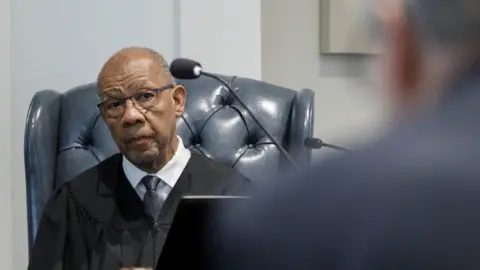Why Alex Murdaugh was spared the death penalty
 Grace Beahm Alford/The Post and Courier/Pool
Grace Beahm Alford/The Post and Courier/PoolIn the minutes before Judge Clifton Newman delivered his sentence for Alex Murdaugh - two life sentences, consecutively, for the murders of his wife and son - he sat back, rocking his chair back and forth, and addressed the defendant directly.
"I don't question at all the decision of the state not to pursue the death penalty," Judge Newman said in a slow and balanced tone. "But I sit here... and reflect on the fact that over the past century your family, including you, have been prosecuting people in this courtroom and many have received the death penalty, probably for lesser conduct."
Murdaugh, standing before him, said nothing.
For six weeks, Judge Newman, 71, presided over Murdaugh's murder trial, one of the most closely watched in the country.
The 22-year veteran of the South Carolina Circuit court was a calm and steady presence, his expressions revealing little about his own impressions of the parade of witnesses and evidence before him. And he revealed nothing about his own family tragedy - the death of his 40-year-old son, Brian which happened just weeks before he assumed control of the Murdaugh case.
Judge Newman spoke in quiet, resonant tones, often in sharp relief to the animated attorneys in his court. At one point, midway through proceedings, he gently chastised defence attorney Jim Griffin for re-tweeting an article that was critical of the prosecution.
"Mr Griffin, is this part of your defence strategy? Or...," he said, trailing off into a pointed silence.
"The judge is supposed be the adult in the room, and he was very much the adult in the room," said Bill Nettles, former US attorney for South Carolina.
"His demeanour is like central casting judge sort of demeanour," he said.
Those weeks of calm seemed to add to the gravity of his words to Murdaugh - someone he had known for years, another player in the tight-knit legal community of South Carolina. "Your case qualifies under our death penalty statute," he said on Friday.
This punishment was taken off the table by prosecutors in December, when South Carolina Attorney General Alan Wilson announced that after "carefully reviewing the facts", the state would not seek the death penalty, opting instead for life without parole.
Legal experts told the BBC that the decision was appropriate, that the death penalty - which has not been used in the state since 2011 - would not have been suitable for Murdaugh's case, one that lacked any direct evidence.
"In order to put somebody to death you really want somebody in the witness box pointing the accusing finger as an eye-witness," said South Carolina lawyer Joe McCulloch. In this case, death penalty would have been a "reach", he said.
But some noted a clear racial disparity in South Carolina's justice system: of the 284 executions carried out by the state since 1912, 75 were white and 209 were black.
"I don't think there's been nearly as fulsome a discussion as there should have been about why it is that people of colour and less resources, having committed heinous, but arguably not as heinous a crime as what Alex Murdaugh did, faced the death penalty and he didn't," former US attorney Nettles said.
Still, Judge Newman on Friday finally made clear his own judgements of the man in front of him, noting his own "heartbreak" at seeing Murdaugh change from "grieving father" to a convicted killer.
"I know you have to see Paul and Maggie during the night times when you are attempting to go to sleep," he said. "I'm sure they come and visit you, I'm sure."
This time, Murdaugh did reply: "All day and every night," he said.
